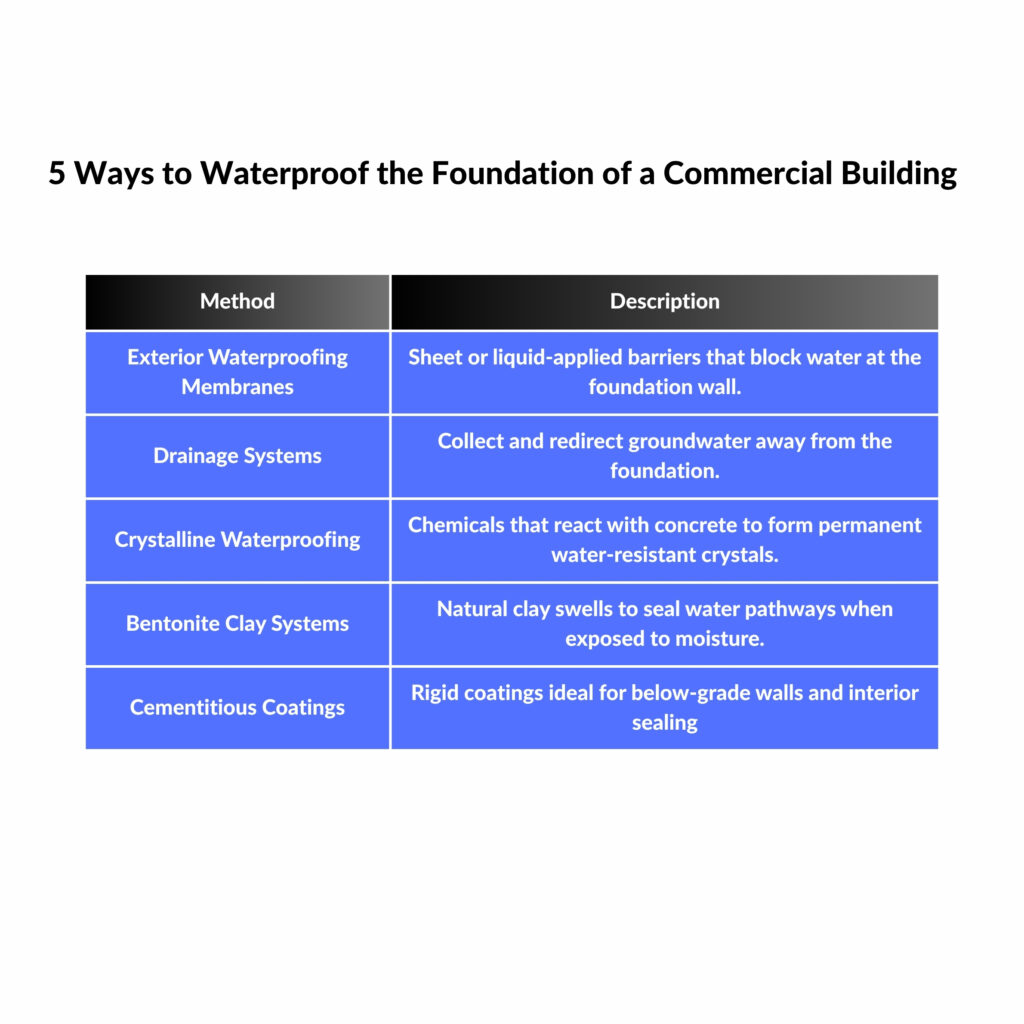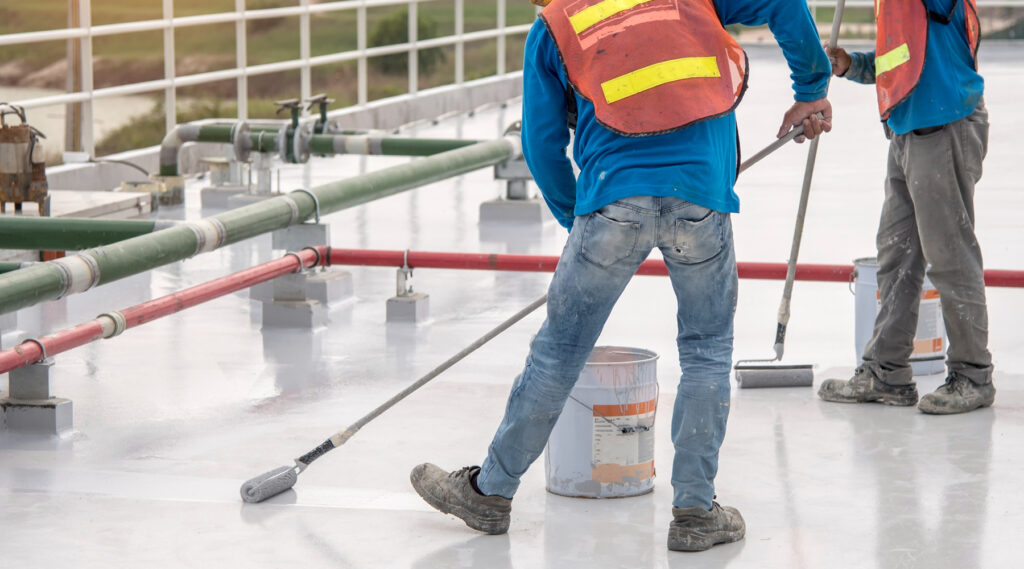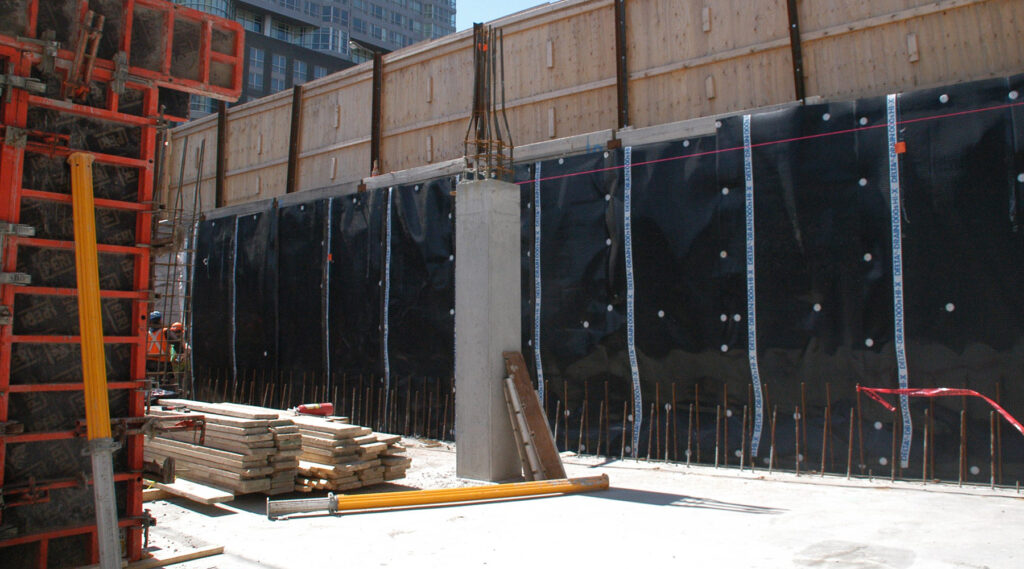Introduction
Water intrusion in commercial buildings is more than just a nuisance—it’s a threat to structural integrity, occupant health, and operational continuity. Without proper waterproofing, foundations can weaken over time, leading to costly damage, business disruptions, and safety concerns.
At Tri-State Waterproofing, we specialize in protecting commercial properties across Georgia, South Carolina, and North Carolina. From high-rise office buildings to industrial warehouses, our commercial waterproofing contractor solutions are built for long-term performance.
What is Commercial Foundation Waterproofing?
Commercial foundation waterproofing is the process of protecting a building’s foundation from moisture and water damage using specialized systems. Unlike residential projects, waterproofing a commercial building involves more complex materials, engineering, and coordination.
Key Differences from Residential Waterproofing
- Larger foundation footprints
- Higher hydrostatic pressure
- Greater need for custom systems
- Coordination with multiple contractors and trades
Why Commercial Foundation Waterproofing Is Important
Commercial foundation waterproofing is not just an added luxury; it’s a critical investment for the long-term health, safety, and financial viability of any commercial property. Here’s why it’s so important
Structural Integrity Risks
- Concrete breakdown from prolonged water exposure
- Steel corrosion within reinforced foundations
- Soil erosion and foundation movement
- Freeze-thaw cycles causing cracking and instability
Financial Impacts
- Expensive structural repairs and water remediation
- Business downtime during repairs
- Higher insurance premiums after claims
- Loss in property resale or leasing value
Health & Safety Hazards
- Mold growth from trapped moisture
- Air quality issues for tenants or employees
- Slip hazards from water leaks
- Electrical dangers near wet zones
6 Essentials to Commercial Foundation Waterproofing
Commercial foundation waterproofing is a multi-faceted process that requires careful planning and execution. To ensure its effectiveness and longevity, six essential elements typically form the core of a robust commercial foundation waterproofing system:
Understanding Site Conditions
Evaluate soil type, water table levels, and weather exposure.
Managing Hydrostatic Pressure
Install systems that withstand underground water force.
Preventing Capillary Rise
Use vapor barriers and sealants to block upward moisture.
Specifying the Right Drainage Board
Choose boards based on site slope and drainage needs.
Proper Detailing at Transitions & Penetrations
Seal joints, pipe entries, and structural connections tightly.
Sequencing with Construction Phases
Integrate waterproofing early in commercial build timelines.
5 Ways to Waterproof the Foundation of a Commercial Building

Types of Commercial Foundation Waterproofing Systems
- Pre-applied Membranes – Installed before concrete pour, ideal for blindside applications
- Post-applied Membranes – Applied after foundation is built, good for open sites
- Integral Admixtures – Waterproofing added directly to concrete mix
- Spray-Applied Sealants – Fast application, covers irregular surfaces
- Composite Drainage Boards – Provide drainage and protection in one system
Special Considerations for Commercial Projects
- Deep foundations and elevator shafts may require blindside waterproofing
- High water tables need additional pressure resistance
- Urban environments call for tight coordination with other trades
- Buoyancy risk in lightweight structures must be factored in
Quality Assurance and Testing Protocols
- Pre-installation inspections to confirm material compatibility
- On-site monitoring to ensure proper application
- Post-installation flood testing or electronic leak detection
- Ongoing performance checks to catch issues early
Ongoing Maintenance and Performance Monitoring
- Schedule inspections annually or biannually
- Watch for efflorescence, rust streaks, or musty smells
- Test sump pumps and maintain drainage systems regularly
Choosing the Right Commercial Waterproofing Contractor Partner
When selecting a commercial waterproofing contractor, look for
- Experience with commercial-grade systems
- Comprehensive support from design to installation and maintenance
- Detailed documentation and manufacturer warranties
- Proven ability to handle complex commercial schedules and challenges
Why Tri-State Waterproofing is Your Ideal Partner
At Tri-State Waterproofing, we bring:
- Deep regional expertise in Georgia, South Carolina, and North Carolina
- Tailored waterproofing plans for both new construction and retrofits
- A commitment to durable systems, professional installation, and post-project support
Conclusion
Commercial foundation waterproofing isn’t optional—it’s essential. Protecting your building from the ground up ensures safety, value, and operational uptime. Whether you’re building from scratch or upgrading an older facility, Tri-State Waterproofing delivers the expertise and systems to keep your property dry for decades.
Ready to protect your investment?
Contact Tri-State Waterproofing today to schedule a professional waterproofing assessment.




